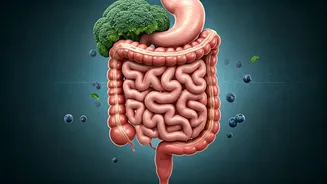Introduction to Gut Health
The gut, often referred to as the second brain, plays a critical role in overall health. It is responsible for nutrient absorption, waste elimination,
and supporting the immune system. A healthy gut contains a diverse microbiome, a community of bacteria that aids in digestion and protects against harmful pathogens. Imbalances in this microbial environment can lead to various health issues, including digestive problems, weakened immunity, and even mental health conditions. Understanding which foods support and which harm the gut is crucial for maintaining optimal health. This article will help you understand which seemingly healthy foods may be damaging your gut health.
Foods Affecting Gut Health
According to the Harvard-trained gastroenterologist, several seemingly healthy foods are damaging to the gut. The article does not specify what those foods are, but a general understanding of gut health and common sensitivities can provide some ideas. Highly processed foods, often marketed as 'healthy,' are rich in additives, preservatives, and artificial sweeteners that can disrupt the gut microbiome and cause inflammation. Excessive consumption of these items can lead to a reduction in the diversity of beneficial bacteria, which contributes to digestive problems, bloating, and other discomforts. Foods high in added sugars, such as those found in many packaged snacks, can also feed harmful bacteria, promoting gut imbalance and inflammation.
The Impact of Gluten
Gluten, a protein found in wheat, barley, and rye, is a known irritant for some. It can trigger an immune response in individuals with celiac disease or non-celiac gluten sensitivity, leading to intestinal damage and a host of symptoms, including abdominal pain, diarrhea, and fatigue. Even without a diagnosed sensitivity, gluten can cause inflammation and disrupt the gut lining in some people. For those who suspect gluten sensitivity, eliminating or reducing gluten-containing foods can often bring significant relief. This means avoiding bread, pasta, and other products made with wheat flour and opting for gluten-free alternatives like rice, quinoa, and other options.
High-Fructose Foods
Foods high in fructose, a type of sugar, can be problematic for the gut. Fructose is found naturally in fruits and honey, but it is also added to many processed foods in the form of high-fructose corn syrup. Excessive fructose intake can be difficult for the body to digest, leading to gas, bloating, and diarrhea. Some people experience fructose malabsorption, which means their small intestine cannot efficiently absorb fructose. This can cause the sugar to ferment in the gut, leading to discomfort and disrupting the balance of gut bacteria. Moderating fructose intake, especially from processed foods, can help improve digestive health.
Dairy and Gut Issues
Dairy products can be another source of gut problems for many people, especially those who are lactose intolerant. Lactose is the sugar found in milk, and lactose intolerance occurs when the body does not produce enough lactase, the enzyme needed to digest lactose. This inability to digest lactose can cause symptoms such as bloating, gas, and diarrhea. Even for people who do not have lactose intolerance, dairy can be inflammatory for some. Experimenting with dairy alternatives, such as almond milk, soy milk, or coconut milk, can help determine if dairy is contributing to digestive issues. Additionally, consuming fermented dairy products like yogurt and kefir may be tolerable due to their lower lactose content and probiotic benefits.
Making Informed Choices
Maintaining a healthy gut requires making informed food choices. This means paying attention to how different foods make you feel and adjusting your diet accordingly. Reducing the intake of processed foods, refined sugars, and excessive fructose and gluten can be beneficial for many. Incorporating a variety of whole, unprocessed foods like fruits, vegetables, lean proteins, and whole grains supports a diverse and healthy gut microbiome. Consider consulting a healthcare professional or a registered dietitian for personalized dietary advice. By focusing on whole foods, identifying potential trigger foods, and making informed choices, you can improve your digestive health and overall well-being.












